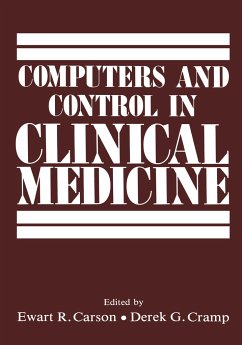- Gebundenes Buch
- Merkliste
- Auf die Merkliste
- Bewerten Bewerten
- Teilen
- Produkt teilen
- Produkterinnerung
- Produkterinnerung
This book is primarily based on the proceedings of a confer en. :::e entitled -Health Psychology: A workshop in Behavioral Medi cine, Treatment and Research Issues,- held April 8-9, 1983 at the University of Oklahoma Health Sciences Center and Oklahoma Chil drens Memorial Hospital, Oklahoma City, Oklahoma. This conference brought together researchers from pediatric psychology, pedia tri cs, clinical psychology, developmental psychology, !1eurology, and psychiatry as part of a continuing medical education ~eries. While Health Psychology and Behavioral Medicine are the fastest growing segments…mehr
Andere Kunden interessierten sich auch für
![Health Psychology Health Psychology]() Arthur R. ZeinerHealth Psychology41,99 €
Arthur R. ZeinerHealth Psychology41,99 €![Chronic Pain and Family Chronic Pain and Family]() Ranjan RoyChronic Pain and Family38,99 €
Ranjan RoyChronic Pain and Family38,99 €![Mechanisms of Psychological Influence on Physical Health Mechanisms of Psychological Influence on Physical Health]() Laura L. CarstensenMechanisms of Psychological Influence on Physical Health109,99 €
Laura L. CarstensenMechanisms of Psychological Influence on Physical Health109,99 €![Stepped Care and E-Health Stepped Care and E-Health]() Stepped Care and E-Health75,99 €
Stepped Care and E-Health75,99 €![Teaching Mindfulness Teaching Mindfulness]() Donald McCownTeaching Mindfulness90,99 €
Donald McCownTeaching Mindfulness90,99 €![Computers and Control in Clinical Medicine Computers and Control in Clinical Medicine]() Ewart R. CarsonComputers and Control in Clinical Medicine41,99 €
Ewart R. CarsonComputers and Control in Clinical Medicine41,99 €![Mechanisms of Psychological Influence on Physical Health Mechanisms of Psychological Influence on Physical Health]() Laura L. CarstensenMechanisms of Psychological Influence on Physical Health39,99 €
Laura L. CarstensenMechanisms of Psychological Influence on Physical Health39,99 €-
-
-
This book is primarily based on the proceedings of a confer en. :::e entitled -Health Psychology: A workshop in Behavioral Medi cine, Treatment and Research Issues,- held April 8-9, 1983 at the University of Oklahoma Health Sciences Center and Oklahoma Chil drens Memorial Hospital, Oklahoma City, Oklahoma. This conference brought together researchers from pediatric psychology, pedia tri cs, clinical psychology, developmental psychology, !1eurology, and psychiatry as part of a continuing medical education ~eries. While Health Psychology and Behavioral Medicine are the fastest growing segments of Psychology, relatively little atten tion has been paid to the pediatric segment of the life cycle. Yet, if we are serious about risk factor reduction and prevention of chronic diseases, it is precisely intervention with the young which will give the largest, most cost-effective results. Thus, the primary focus of the conference was on the pedia tric aspects of health and disease. Chapter 1 deals with the problems of behavioral health and sets forth some goals for our nation by the year 1990. Chapters 2 and 3 present an overview of behavioral medicine and the research trends current and predictive of the future for the field. Chapter 4 takes on issues about psychology, child health, and human deve lopment. Chapter 5 addresses issues in pediatric medical compl i ance and how this situation might be improved. Chapter 6 deals wi th prematurity and the family, and Chapter 7 addresses pain management problems in the young.
Hinweis: Dieser Artikel kann nur an eine deutsche Lieferadresse ausgeliefert werden.
Hinweis: Dieser Artikel kann nur an eine deutsche Lieferadresse ausgeliefert werden.
Produktdetails
- Produktdetails
- Verlag: Springer, Berlin
- 1985
- Seitenzahl: 286
- Erscheinungstermin: 1. Januar 1985
- Englisch
- Gewicht: 718g
- ISBN-13: 9780306418907
- ISBN-10: 0306418908
- Artikelnr.: 24530588
- Herstellerkennzeichnung
- Libri GmbH
- Europaallee 1
- 36244 Bad Hersfeld
- gpsr@libri.de
- Verlag: Springer, Berlin
- 1985
- Seitenzahl: 286
- Erscheinungstermin: 1. Januar 1985
- Englisch
- Gewicht: 718g
- ISBN-13: 9780306418907
- ISBN-10: 0306418908
- Artikelnr.: 24530588
- Herstellerkennzeichnung
- Libri GmbH
- Europaallee 1
- 36244 Bad Hersfeld
- gpsr@libri.de
1 Behavioral Health: Focus on Preventive Child Health Behavior.- Health Psychology and Behavioral Health.- Salutogenesis and Behavioral Health.- Social Support and Coping Responses.- Models for Preventive Intervention in Child Behavioral Health.- Approaches to Macrosystems Change: Behavior Health and Social Policy.- Challenges Awaiting Psychology in Child Behavioral Health.- Conclusions.- References.- 2 An Overview of Behavioral Medicine.- Mental Health, Medical Model, and Behavioral Health.- Mind-Body Problem.- History of Psychosomatic Medicine.- The Emergence of Behavioral Medicine.- Definitions of Behavioral Medicine.- Development of Behavioral Medicine.- References.- 3 Research Trends In Behavioral Medicine.- Research Trends in Track I: The Behaviorism Definition.- Research Trends in Track II: The Yale Definition.- References.- 4 Psychology, Child Health, and Human Development.- Pediatric Psychology.- Health Psychology.- Behavioral Medicine.- The Tortoise and the Hare.- References.- 5 Medical Adherence In Pediatric Populations.- Assessment of Adherence.- Factors Associated with Adherence.- Behavioral Intervention Strategies.- Summary.- References.- 6 Prematurity and The Family.- to Medical Aspects of Prematurity.- Parental Response to the Birth of a Premature Infant: Grief Reactions.- Competencies of the Healthy Neonate.- The High Risk Experience.- Effects of Early Intervention and Stimulation on Pre-term Infants.- Conclusions.- References.- 7 Pain in Children: an Overview of Psychological Assessment and Intervention.- Definition.- Acute vs. Chronic Pain.- Common Pain Problems.- Assessment.- Psychological Intervention.- Summary and Conclusions.- References.- 8 Issues in Treating Adolescent Substance Abuse.- Efstratios Demetriou, William Shaw.- Epidemiology of Adolescent Drug Use.- Patterns of Adolescent Drug Abuse.- Abuse vs. Addiction vs. Dependence.- Risk Factors.- Maintenance of the Abusive Pattern.- How Does the Drug-Using Adolescent Present to the Primary Care Physician?.- Medical Complications of Drug Use.- Preventive Interventions.- Talking to Teenagers About Drugs.- Assessing Readiness for Treatment.- Summary.- References.- 9 Cognitive Aspects of Illness and Health.- Differences in Patient-Physician Models.- The Cognitive and Perceptual Basis of Patient Models.- Dissonance in Patient-Physician Models Affect Compliance.- References.- 10 Research Update of Behavioral Interventions For Essential Hypertension: The Role of Cognitive Factors.- Review of Studies.- Discussion of Studies.- The Individual Hypertensive Patient s Perspective.- The Experimenter s or Therapist s Perspective.- The Current Conceptual Framework of Hypertension Research.- Summary and Conclusions.- References.- 11 Issues in The Development of Collaborative Services Between Psychology and Neurology.
1 Behavioral Health: Focus on Preventive Child Health Behavior.- Health Psychology and Behavioral Health.- Salutogenesis and Behavioral Health.- Social Support and Coping Responses.- Models for Preventive Intervention in Child Behavioral Health.- Approaches to Macrosystems Change: Behavior Health and Social Policy.- Challenges Awaiting Psychology in Child Behavioral Health.- Conclusions.- References.- 2 An Overview of Behavioral Medicine.- Mental Health, Medical Model, and Behavioral Health.- Mind-Body Problem.- History of Psychosomatic Medicine.- The Emergence of Behavioral Medicine.- Definitions of Behavioral Medicine.- Development of Behavioral Medicine.- References.- 3 Research Trends In Behavioral Medicine.- Research Trends in Track I: The Behaviorism Definition.- Research Trends in Track II: The Yale Definition.- References.- 4 Psychology, Child Health, and Human Development.- Pediatric Psychology.- Health Psychology.- Behavioral Medicine.- The Tortoise and the Hare.- References.- 5 Medical Adherence In Pediatric Populations.- Assessment of Adherence.- Factors Associated with Adherence.- Behavioral Intervention Strategies.- Summary.- References.- 6 Prematurity and The Family.- to Medical Aspects of Prematurity.- Parental Response to the Birth of a Premature Infant: Grief Reactions.- Competencies of the Healthy Neonate.- The High Risk Experience.- Effects of Early Intervention and Stimulation on Pre-term Infants.- Conclusions.- References.- 7 Pain in Children: an Overview of Psychological Assessment and Intervention.- Definition.- Acute vs. Chronic Pain.- Common Pain Problems.- Assessment.- Psychological Intervention.- Summary and Conclusions.- References.- 8 Issues in Treating Adolescent Substance Abuse.- Efstratios Demetriou, William Shaw.- Epidemiology of Adolescent Drug Use.- Patterns of Adolescent Drug Abuse.- Abuse vs. Addiction vs. Dependence.- Risk Factors.- Maintenance of the Abusive Pattern.- How Does the Drug-Using Adolescent Present to the Primary Care Physician?.- Medical Complications of Drug Use.- Preventive Interventions.- Talking to Teenagers About Drugs.- Assessing Readiness for Treatment.- Summary.- References.- 9 Cognitive Aspects of Illness and Health.- Differences in Patient-Physician Models.- The Cognitive and Perceptual Basis of Patient Models.- Dissonance in Patient-Physician Models Affect Compliance.- References.- 10 Research Update of Behavioral Interventions For Essential Hypertension: The Role of Cognitive Factors.- Review of Studies.- Discussion of Studies.- The Individual Hypertensive Patient's Perspective.- The Experimenter's or Therapist's Perspective.- The Current Conceptual Framework of Hypertension Research.- Summary and Conclusions.- References.- 11 Issues in The Development of Collaborative Services Between Psychology and Neurology.
1 Behavioral Health: Focus on Preventive Child Health Behavior.- Health Psychology and Behavioral Health.- Salutogenesis and Behavioral Health.- Social Support and Coping Responses.- Models for Preventive Intervention in Child Behavioral Health.- Approaches to Macrosystems Change: Behavior Health and Social Policy.- Challenges Awaiting Psychology in Child Behavioral Health.- Conclusions.- References.- 2 An Overview of Behavioral Medicine.- Mental Health, Medical Model, and Behavioral Health.- Mind-Body Problem.- History of Psychosomatic Medicine.- The Emergence of Behavioral Medicine.- Definitions of Behavioral Medicine.- Development of Behavioral Medicine.- References.- 3 Research Trends In Behavioral Medicine.- Research Trends in Track I: The Behaviorism Definition.- Research Trends in Track II: The Yale Definition.- References.- 4 Psychology, Child Health, and Human Development.- Pediatric Psychology.- Health Psychology.- Behavioral Medicine.- The Tortoise and the Hare.- References.- 5 Medical Adherence In Pediatric Populations.- Assessment of Adherence.- Factors Associated with Adherence.- Behavioral Intervention Strategies.- Summary.- References.- 6 Prematurity and The Family.- to Medical Aspects of Prematurity.- Parental Response to the Birth of a Premature Infant: Grief Reactions.- Competencies of the Healthy Neonate.- The High Risk Experience.- Effects of Early Intervention and Stimulation on Pre-term Infants.- Conclusions.- References.- 7 Pain in Children: an Overview of Psychological Assessment and Intervention.- Definition.- Acute vs. Chronic Pain.- Common Pain Problems.- Assessment.- Psychological Intervention.- Summary and Conclusions.- References.- 8 Issues in Treating Adolescent Substance Abuse.- Efstratios Demetriou, William Shaw.- Epidemiology of Adolescent Drug Use.- Patterns of Adolescent Drug Abuse.- Abuse vs. Addiction vs. Dependence.- Risk Factors.- Maintenance of the Abusive Pattern.- How Does the Drug-Using Adolescent Present to the Primary Care Physician?.- Medical Complications of Drug Use.- Preventive Interventions.- Talking to Teenagers About Drugs.- Assessing Readiness for Treatment.- Summary.- References.- 9 Cognitive Aspects of Illness and Health.- Differences in Patient-Physician Models.- The Cognitive and Perceptual Basis of Patient Models.- Dissonance in Patient-Physician Models Affect Compliance.- References.- 10 Research Update of Behavioral Interventions For Essential Hypertension: The Role of Cognitive Factors.- Review of Studies.- Discussion of Studies.- The Individual Hypertensive Patient s Perspective.- The Experimenter s or Therapist s Perspective.- The Current Conceptual Framework of Hypertension Research.- Summary and Conclusions.- References.- 11 Issues in The Development of Collaborative Services Between Psychology and Neurology.
1 Behavioral Health: Focus on Preventive Child Health Behavior.- Health Psychology and Behavioral Health.- Salutogenesis and Behavioral Health.- Social Support and Coping Responses.- Models for Preventive Intervention in Child Behavioral Health.- Approaches to Macrosystems Change: Behavior Health and Social Policy.- Challenges Awaiting Psychology in Child Behavioral Health.- Conclusions.- References.- 2 An Overview of Behavioral Medicine.- Mental Health, Medical Model, and Behavioral Health.- Mind-Body Problem.- History of Psychosomatic Medicine.- The Emergence of Behavioral Medicine.- Definitions of Behavioral Medicine.- Development of Behavioral Medicine.- References.- 3 Research Trends In Behavioral Medicine.- Research Trends in Track I: The Behaviorism Definition.- Research Trends in Track II: The Yale Definition.- References.- 4 Psychology, Child Health, and Human Development.- Pediatric Psychology.- Health Psychology.- Behavioral Medicine.- The Tortoise and the Hare.- References.- 5 Medical Adherence In Pediatric Populations.- Assessment of Adherence.- Factors Associated with Adherence.- Behavioral Intervention Strategies.- Summary.- References.- 6 Prematurity and The Family.- to Medical Aspects of Prematurity.- Parental Response to the Birth of a Premature Infant: Grief Reactions.- Competencies of the Healthy Neonate.- The High Risk Experience.- Effects of Early Intervention and Stimulation on Pre-term Infants.- Conclusions.- References.- 7 Pain in Children: an Overview of Psychological Assessment and Intervention.- Definition.- Acute vs. Chronic Pain.- Common Pain Problems.- Assessment.- Psychological Intervention.- Summary and Conclusions.- References.- 8 Issues in Treating Adolescent Substance Abuse.- Efstratios Demetriou, William Shaw.- Epidemiology of Adolescent Drug Use.- Patterns of Adolescent Drug Abuse.- Abuse vs. Addiction vs. Dependence.- Risk Factors.- Maintenance of the Abusive Pattern.- How Does the Drug-Using Adolescent Present to the Primary Care Physician?.- Medical Complications of Drug Use.- Preventive Interventions.- Talking to Teenagers About Drugs.- Assessing Readiness for Treatment.- Summary.- References.- 9 Cognitive Aspects of Illness and Health.- Differences in Patient-Physician Models.- The Cognitive and Perceptual Basis of Patient Models.- Dissonance in Patient-Physician Models Affect Compliance.- References.- 10 Research Update of Behavioral Interventions For Essential Hypertension: The Role of Cognitive Factors.- Review of Studies.- Discussion of Studies.- The Individual Hypertensive Patient's Perspective.- The Experimenter's or Therapist's Perspective.- The Current Conceptual Framework of Hypertension Research.- Summary and Conclusions.- References.- 11 Issues in The Development of Collaborative Services Between Psychology and Neurology.









